Parker Posey's Innate Curiosities
"I don’t go into things thinking they're funny. I think I learned that from the Chris Guest movies. You take it very seriously."
“Can you tell me?” Parker Posey asks with a child-like earnestness. She’s peering at me through the screen over the top of her pink-tinted sunglasses. “I don't look at press. Tell me what everyone is saying about it.” She stares back at me, waiting for me to tell her, to illuminate her. We’re here to discuss her appearance in Ari Aster’s Beau Is Afraid, but on the agenda is a more holistic view at a career that’s spanned three decades and included classics like Coneheads, Dazed and Confused, Party Girl, The House of Yes, Waiting for Guffman, Scream 3, Best in Show, Josie and the Pussycats, The Sweetest Thing and more.
“I'm the only choice for these guys — that’s how I get cast,” she says when I asked her how she consistently manages to be the apple of so many auteurs’ eyes. “They write specifically for me. Because if it was going to go through the system, I would not get the part. That's just how it is. There's a list of other actresses that go before me, and it's always been this way: There has to be a strong director, and they have to write for me, but they also have to fight for me in a certain way for me to play the part.”
Posey is that rare, almost mythic type of screen performer that improves the quality of a project by her mere attachment. I guess, to put it plainly, you could call it je ne sais quoi. In a less well, duh sense: I could watch Posey enter a room 100 times. It’s not that she’d enter the room 100 different ways, so much as I’d find 100, perhaps 1000, areas to fix my eye on. I’m reminded of a line Mickey tells Valerie on Season 1 of The Comeback: “You reading a book is enough. You crossing the street is enough. Trust me sweetheart, you have always been and will always be enough.” I’m tempted, as the trope goes, to say she is, in fact, more than enough. But that’s not right. Posey’s performances are always calibrated with such exactness that she ends up being less the cherry on top and more a central ingredient that holds it all together. The cherry is great, but you take one bite and forget about it. She’s more foundational.
“What’s everyone saying about the film?” I tell her. “They’re saying two words: Parker Posey.”
I recently reread your fantastic book, You're on an Airplane: A Self-Mythologizing Memoir, and there's an anecdote that reminded me of a scene from Beau Is Afraid. There's that sequence in the film when Beau’s bathtub floods and it made me recall a memory that you share in the book when you were living in Chelsea in the ‘90s and your bathtub would overflow and flood into the downstairs beauty shop. Did you make that connection at all?
No, I didn't, but I should have! Plumbing issues and the flooding of apartments and the bursting of pipes is a running theme in my life. In this apartment here, for instance, during the inspection, the valve didn't get shut off properly, so the kitchen flooded. I've been in the midst of a real estate debacle for the past five years. So the plumbing… I’m a water sign, Evan! What can I tell you? There’s a lot of water flowing. But yes, I love the symbols in Beau Is Afraid so much, like how long it takes him to wake up; [laughs] he doesn’t know what time it is! All the people who come banging on his door, the graffiti outside his apartment. Just the difficulties of what it can feel like to just wake up and get out your door. I think Joaquin is so funny, and he’s one of my favorite actors, so I was happy to jump in his water with this movie. What did you think of it?
I have to tell you Parker, this is my first Ari Aster film, bizarrely enough. I actually saw Beau and then retroactively watched Hereditary and Midsommar, so I feel like I have a very unique lens by way of the order in which I viewed his filmography. Everything else I’ve read and digested about Beau Is Afraid was processed through the lens of it being his third film, whereas for me, it was my first.
I saw Hereditary on a plane and I have never seen images like that in my life. I've never been so affected in this way by watching a movie. It's a horror film, but it’s more than that. Ari is like Stanley Kubrick. He’s a real auteur, he's a real storyteller. He’s a fan of cinema. And so I watched that scary movie all by myself, again, when I got home. I was like, “I just have to see this again. This is so good.” Some of the images in Beau Is Afraid have stayed with me, too. I wonder if you feel the same?
Absolutely! It's funny: It took me a long time after watching the film to re-enter real life. All I wanted to do was talk to people about it, but they hadn't yet seen it because I went to an advance screening. I've been watching all the press that you and your fellow actors have been doing around the film, and I imagine it must be difficult to talk about because there’s the plot of the film, but there's also the experience of the film and the emotion it evokes in all of us who see it. And so I feel like when I talk about Beau Is Afraid, I'm kind of like… you just gotta go see it.
It's like you're encountering something that you’ve never encountered before. It elicits these feelings that you don't quite know how to express. Like Jeeves: I think it’s because my dad was a Vietnam vet and the extension of their house where Jeeves is living, and then when she swallows all that paint — all of that. I find it so emotional. And then there's another part of my brain going, “How did Ari come up with this mishmash in creating these things right now?” Like that scene with the girls in the car where they’re trying to smoke pot, and how scary and funny and [disorienting] and mean! Is this where kids are these days? You don't quite know what’s going on. Is everyone a part of Beau’s imagination? I tell you what: Patti and I both came in towards the end of production and Joaquin had been working for a few months and doing all his stuff that he did in the beginning because they shot in order. So we came at the tail end and we had only worked a couple of days, but you could already feel that it was a world [of its own] and that it was very successful in creating this atmosphere. I came to set the day they were shooting the scene in the attic, and Ari was like, “I can't believe you're here on this day.” And I was like, “It looks great!” [Laughs]
I’ve seen a lot of 30 minute-long YouTube videos that a lot of straight white men have made — as you might imagine — breaking down their interpretations of the film. It’s a film that people really like to try to decipher. And the best part about it is that from what I've seen and read and heard of Ari, it's sort of up to the viewer to decide. Ari's not someone that seems very conclusive about what you should take from the material, which I think is another hallmark of an auteur. Ari delivers you the goods and how you choose to consume them is up to you.
I feel like the timing is great because I think it has brought people back into theaters and brought them back into remembering what cinema is. Eric von Stroheim and all of those [types] would release 8 hour movies and they were like, “It’s going to be MY way!” And now we have A24 on the rise and really supporting our auteurs. They’re like, “We’re going to let these filmmakers do whatever they want and tell the stories how they want to tell them.” So what’s been exciting for me is that it feels like a full circle moment because I worked with Ari and Antonio Campos at the same time. We shot The Staircase and Beau Is Afraid at the same time. I met Antonio in 2008 during Broken English when we were at the Deauville Film Festival together, and I'm just glad that these young filmmakers have found parts for me in their work.
Tell me about filming what is essentially one long scene in which your character, Elaine, and the titular character, Beau, reunite after many years at his mother’s memorial.
There's a lot to it. I had three takes, and the second one was just alive in this way that felt haunted. My prep work for this was getting a body cast in Atlanta while shooting The Staircase and two hours covered in dental mold, naked, and kind of looking at my life and my body and my work.
I'm just there for a second, and the way that I exit [Beau is Afraid], it's such a fine line of annihilation and liberation at the same time. I think acting has that quality for me. I was listening to something about how if you find an opportunity to go into a dark cave, then go into the dark cave. Take that journey into the unknown and see what that’s like, because you know you're going to come out the other end and you’re going to be changed. I felt that particular way with both of these jobs. So, yeah. It was a trip. And when I first saw Patti [LuPone], she was standing outside on a balcony in a robe, with her hands extended like Evita in the middle of nowhere outside of Montreal. It was a magical time. There was a man there who was the manager of the hotel that we were staying in named Andre and he serenaded us. He came and sat down with us — I think we were the only people staying at this hotel — and he was this crooner. He's a singer. I hope to write about it one day. I'm still processing it all.
A particular line of yours in the film had the theater howling and has absolutely stayed with me: Right after Beau climaxes, you say, “You burst right through the bag.” Did you realize that was going to be such an instant classic?
I don’t go into things thinking they're funny. I think I learned that from the Christopher Guest movies. I don't know exactly what Ari wanted. I just know that he wanted this really distinct shift from like, “I wanted you to wait for me, Beau!” and “I wanted that too!” and this young lovers, archetypal meeting-again: They were fated to meet now, at the death of his mother, and now they're going to run off. And then she passes in through the door and then it's all business. Like, “Okay, where's the bedroom? Okay. And God, the Dragon's Lair. And what is this?” Just rummaging through Mona’s stuff. It's neat when you play a small part, and there's so much you can read into when you see it in the film and see the story that Ari was able to tell, and the emotion behind it! I don't think I know of another director who specifically works in eliciting humor and fear and matters of the heart. Do you feel sorry for Beau, or do you think he should grow up? How do you feel about him as a hero? And then there’s the Orphans [of the] Forest, which I love the most, being an actor. Did you have that dream as a young person to run off to the woods and just find those people and make plays and build your own costumes? And then a part of you is like, “Thank you, Ari! You feel that too?” There’s something just really beautiful about that. And then it just trips out and Joaquin is meeting himself as a father but also meeting his sons and it just gives me that great feeling. There’s this feeling, particularly for women, that I think starts during puberty about the kind of unknown territory inside that we really can't define, we really can't express, and we don’t have the words to express it. I think Ari is pinpointing that feeling.
You have been in the hands of these auteurs — Ari Aster, Christopher Guest — quite a bit throughout your career. Are you the kind of person that wonders, “What is it about me that attracts all of these geniuses to someone like me?”
I think it's really hard for filmmakers to get a movie made. And being in New York in the 90s, there was a window, [but] I wasn't always the first choice. I think they went to Winona Ryder first for The House of Yes.
There was just a collective of filmmakers back then and I worked in a particular way and they wanted to work with me again. But, the Chris Guest family: That's really like a family, right? I feel archetypal in a way; I don’t “do” comedy or drama, but I do hold both of those in me.
Where do you think that comes from?
My parents liked really good movies and had the critical eye, but I think a big part of the actor’s path is having luck. I do think it has to be you, but you can't really force anything. So you [could] look at my career from the outside and be like, “Oh, wow, wow, wow! She’s worked with all these people!” But wow, it's not easy. I'm sure you've heard: It's not, like, the greatest industry for women. [Laughs]
I have heard that.
Misogyny is everywhere. It’s a Boys’ Club. And it is agonizing, but I'm just so grateful. Antonio had The Staircase in mind in 2009 and it took all that time for it to come to fruition, right at the same time that Ari got his movie together. In Superman Returns, Ryan Singer and the guys were like, “We need someone strong for this part that can act with Kevin Spacey,” and so they're like, “This is Parker.” So I fit into a certain size [of] role and a certain tempo. I was just talking to Zoe Cassavetes last week: She directed Broken English, and we were talking about a sequel to that. We were talking about new forms and making a documentary. We'll see what happens with that.
You spoke in a New York Times interview earlier this year about this subject and becoming aware of just how intensely male-dominated our stories are. You said that as you matured, you became more cognizant of it. When did you begin to have that thought?
My early 30s. It’s been quite a while of [coming to understand] the male gaze. I found out that in Blade: Trinity, I was gonna play a vampire. And my boyfriend at the time was like, “Oh, yeah! A vampire? That’s so hot!” And I didn’t really get it. I thought it was so absurd. [Laughs] And then, of course, vampires are so popular, but there’s something to it when you know that there could be more to the story than just your part. It seems like the men have the room for their story, but the women are just there for the men. And I thought that with Freda Black, working on The Staircase. With history to unravel and talking to her friends and seeing what an interesting person she was, it's heartbreaking because there's so much more to these women's lives than we get to see. I'll always be pining for that: I'll always want to dig deeper into everything and see the whole story. When I work, I just feel like I'm uncovering things and I'm digging around the soil. I think I denied a lot of how brutal [the misogyny in the industry] really is because you think, “I've worked really hard for not a lot of money and I really paid my dues, so I should be able to do the same thing [as men].”
What inspired you to want to write not just a book, but a memoir, especially when you have so much life left to live?
Originally, I wanted to write something like theater, or a book of monologues, but what would that look like? So I went to small-town theaters and brought myself as a cardboard cutout, as a character, and people could take pictures with the cardboard cutout and I would teach monologues on stage and acting class. Everyone wants to be on stage right now. I've noticed that there really is not a lot of boundary between the audience and the stage. People are jumping on ice and talking back to the theater. And I remember Joseph Gordon-Levitt did something at Sundance where he was inviting people on stage, and everyone had their phones and it was like: social media and this relationship to our phones and theater and games, it's all kind of a FOMO [situation]. It's a different kind of theater. I think things have changed a lot and there are still new things to be made. I still think of new forms, and when I was writing the book, I wanted to hear people's stories. I wanted to give them an assignment and look at the pictures from their grandparents and get them to make collages and open up. I think about the loss of craft and I worry about this disconnect with kids who aren’t running out and playing in the yard here in cities; what to make story-wise. So that was the idea with the book, just to go out and make some kind of theater with it in these towns. And I’m late to RuPaul’s Drag Race, but it’s like the small town thing that they did [with We’re Here].
We need you on RuPaul's Drag Race. Hopefully we get you as a guest judge on a future season. Now, I know that you have social media, but you're not really active on it. In the New York Times article I mentioned earlier, you said, “To be online and have a social media presence is kind of to be your own magazine. I need to learn.” Is learning about social media something you're really interested in, or is it something that you kind of recognize is not really for you? From what you're saying, it sounds like you're interested in tactile things, in being out in the world. I feel like the basis of social media is to sort of step away from the world and view it through a prism.
I agree with you. We’re up against an algorithm. I barely go online. I don't read articles about myself or look at reviews. I haven't posted on Instagram [in ages]. I feel very protective because I'm nervous about it. I don't want to say the wrong thing. I'm just a little shy of it. I want to be a free person. But I think there are things in new media to make, and I think they could really bring people down to some kind of collective, I don't know, hippie train? But really, there’s all sorts of healing arts stuff like sound therapy that could happen, that needs to happen in this traumatic, Kafka-esque landscape that Ari Aster and Beau Is Afraid so eloquently inhabit.
You have one of those resumes that's chock-full of beloved films. When people approach you and say, “I love you in ___,” what is your favorite thing for them to be referring to?
Probably Best in Show. Or maybe Party Girl. There are parts that I did way back that I'm so glad that the younger generation says they [get], because I did it with that in mind. Like, this is for those kids watching the TV right now. Get them up dancing, get them up playing around, being stupid, being funny and dressing up and just being free. Hopefully, dressing like me for Halloween. There’s a part of me, with wardrobe sometimes, that I’m just like, “Let’s Halloween costume it. Put all of this together.” Like cosplay. That’s an outlet.
Waiting for Guffman is among my favorite of your films. There's a deleted scene on the DVD and it's your character, Libby, auditioning for Red, White and Blue, which is the musical chronicling the history of the town that Waiting for Guffman is set in. What do you recall of that monologue? It's such a bummer that it's not in the film.
Chris had 80 hours of footage and had to whittle it down to an hour and something. In one of the first cuts that he did — which he wasn't even in — I happened to be in London at the same time he was editing that, and his producer Karen Murphy was like, “When you talk to Chris, will you please tell him to put himself back in the film? He's cutting his performance out of it.” He cuts for jokes. He cuts for the timing of that. What was so fun about this movie is that you didn’t know you were being funny when you're taking it so seriously. Chris is so relaxed, so kind and so funny. He just has that brain, and I just felt so comfortable with him. I felt like he was family; like an uncle. He was really great about taking me under his wing and just being a good example. So when he called me and said, “You need a song for the audition,” at first I wanted Melissa Manchester’s “Don't Cry Out Loud” and [Chris] said, “Oh, okay, I went to college with her,” but it ended up not working. So I said, “What about Journey’s ‘When The Lights Go Down In The City’?” and he said, “I don't know about getting the rights to it.” And The Doors, they came up and then he said, “But also… you can write a monologue.”
How long did it take you to write the monologue?
I just sat down and wrote it in an afternoon and I sent it to him, and he was like, “Okay! It looks good.” And then we shot it, and it was the first day I’d met Bob Balaban. We were all so nervous — Catherine [O’Hara] and Fred Willard, too — and we were walking around the high school and the classrooms and we were really nervous, and that was fun! And I just did that monologue. Jamie Lee Curtis, [Chris’s] wife, really loved that, and she still quotes that: “Who's on top and who's on bottom now?” That was really fun! Bob Odenkirk, who plays the priest, showed up to his audition in vampire makeup and we don't even see what he says, but he had an audition. Everyone had an audition. And so Catherine and Fred's audition was Ron and Sheila (their characters) re-enacting their favorite coffee commercial, and so they asked for the rights for “Midnight at the Oasis” by Maria Muldaur. I think Chris knew [her] as well. And then they wrote in that whole thing. Their audition is really a coffee commercial around the song “Midnight at the Oasis.” So you see, with that much freedom, you can come up with anything, and sometimes it works and sometimes it doesn't. It makes it in it, or maybe it doesn’t.
How do you define or think about your style? Like what you were saying earlier about the costume: You like lots of specific choices being made because the idea, as you articulated it, is the possibility that people could dress up as the character for Halloween. And in order to do that, the character has to have distinguishing qualities. I think about your haircut in Best in Show, for instance, as hyper-specific.
And your style, similarly: I'm looking at your neck right now, at the cut of the shirt you're wearing and the choice to wear pink-tinted sunglasses indoors — which I love, by the way. So I would say that I think of your style as hyper-specific, but how do you think about it?
I like that. I think style is fun. I think it's a conversation, in a way. I stomp around, so I like shoes that can be worn a lot. I'm kind of a hippie, really, but then I like to dress up, too and have that kind of fun. If you think about the last hundred years of style and fashion and design and where we're at now, this country is just getting into design. There’s a lot of new art coming alive here.
It makes me think about what you were saying earlier about the lack of appreciation for auteurs. I feel similarly in the world of fashion. I think about figures like Isaac Mizrahi or Zac Posen who no longer have their eponymous lines. These are two of the most incredible artisans that exist in the world of fashion, and there was just a lack of appreciation for their work.
You know, it's not the Age of Enlightenment. [Laughs] There’s not a Renaissance right now. In my forties, I was working and I ran out of money. I wasn't getting paid enough. I had to sell my apartment. The [gender pay] discrepancy and the lack of support. But then you go, “Whoa. This is a path. This is a path.” So, perseverance for those two [designers]. Keep making, keep doing, keep the shimmy on.
Tell me if I'm wrong, but you don’t seem like someone that's overly interested in talking about yourself. You more so seem to have a curiosity about others.
YES! I want to listen to you! If we were dancing, I would want to follow you; let you lead so I can lose myself to the song. That's why I love New York so much. You go out the door, and you’re just so curious about what’s going to happen. You don't know what's going to happen outside of it. And I love connecting things. Someone was telling me about Bjork's new album and how it’s all about the mycelium network. And I read that book, How to Change Your Mind by Michael Pollan. If I could be in any other business or world, [it would be] the healing arts and what they’re discovering with the neural pathways of our brains and depression and alternative therapies and individualized medicine. I'm very excited and inspired by these things. I think there's so much room for new forms to help, with actors and TV and streaming and things like that. Not just in a commercial way, but in a way that calms us down. And I think podcasts and what you’re doing are helping with openness and communication, so thank you.
You mentioned earlier how you're not someone who's heavily online, but I want you to know that for whatever it's worth, the Internet really, really loves you. You are very, very, very beloved. When I found out that I had the opportunity to chat with you, it shifted something inside of me at the mere thought of it, just because you're someone who people are so interested in, both as a performer and also as a thinker. You’ve proven in the last hour that you aren't bending and conforming to the way society constricts us so much these days. I come back to those gorgeous pink glasses: You are just constantly making choices in the world and in your work, and I think that's so admirable. And I want you to know that in the pockets of the Internet that I'm on, you are in that top tier of beloved.
That is so sweet and good to hear. When [my dog] Gracie passed, I was posting about that, and the messages I got from people who were following me meant so much to me and there was this sweetness to them. I do believe in that collective cohesion of goodness, and you telling me that is proof of it.

Someone mentioned to me that they were at a dog park one day and their dog came up and sat on your lap by accident. They were super apologetic and you were like, “No, no!” You were so excited to have this dog in front of you. So even the anecdotes I hear of people encountering you around New York are a testament to your character. I want you to know that whether you are directing next or if you write a follow-up to your last memoir, there is a rapt audience of people that want to follow you wherever life takes you. A lot of us are going to follow.
Can I tell you a quick story? A dog story about Key & Peele. I had just seen their show and I was at Sid Gold’s, a piano bar in Chelsea, and Joe McGinty was there. So I was like, “I have to tell him how much I love [Key & Peele]. So I went up to him and I was like, “I just want to introduce myself. I’m such a big fan of the show.” And he said, “Oh, well, we’ve met already!” And I was like, “Really?” And he said, “Yes! You were at Washington Square Park Dog Run and you asked me to watch your dog as you went to get a coffee, and you asked me if I wanted one!” It’s a small town! Treat New York like a small town, because it really can be. You might run into me next week!


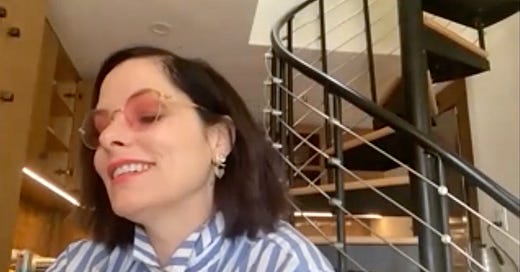




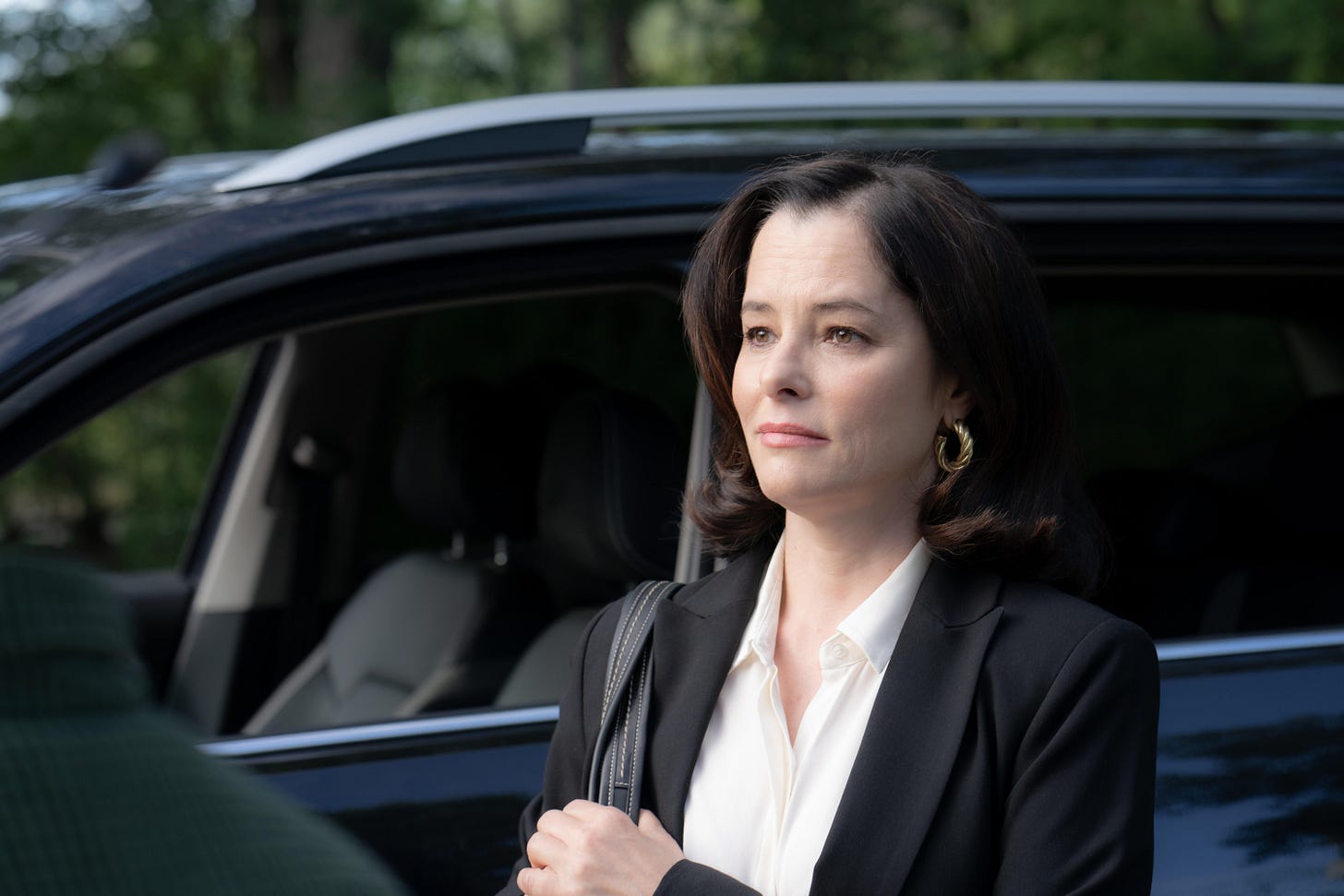
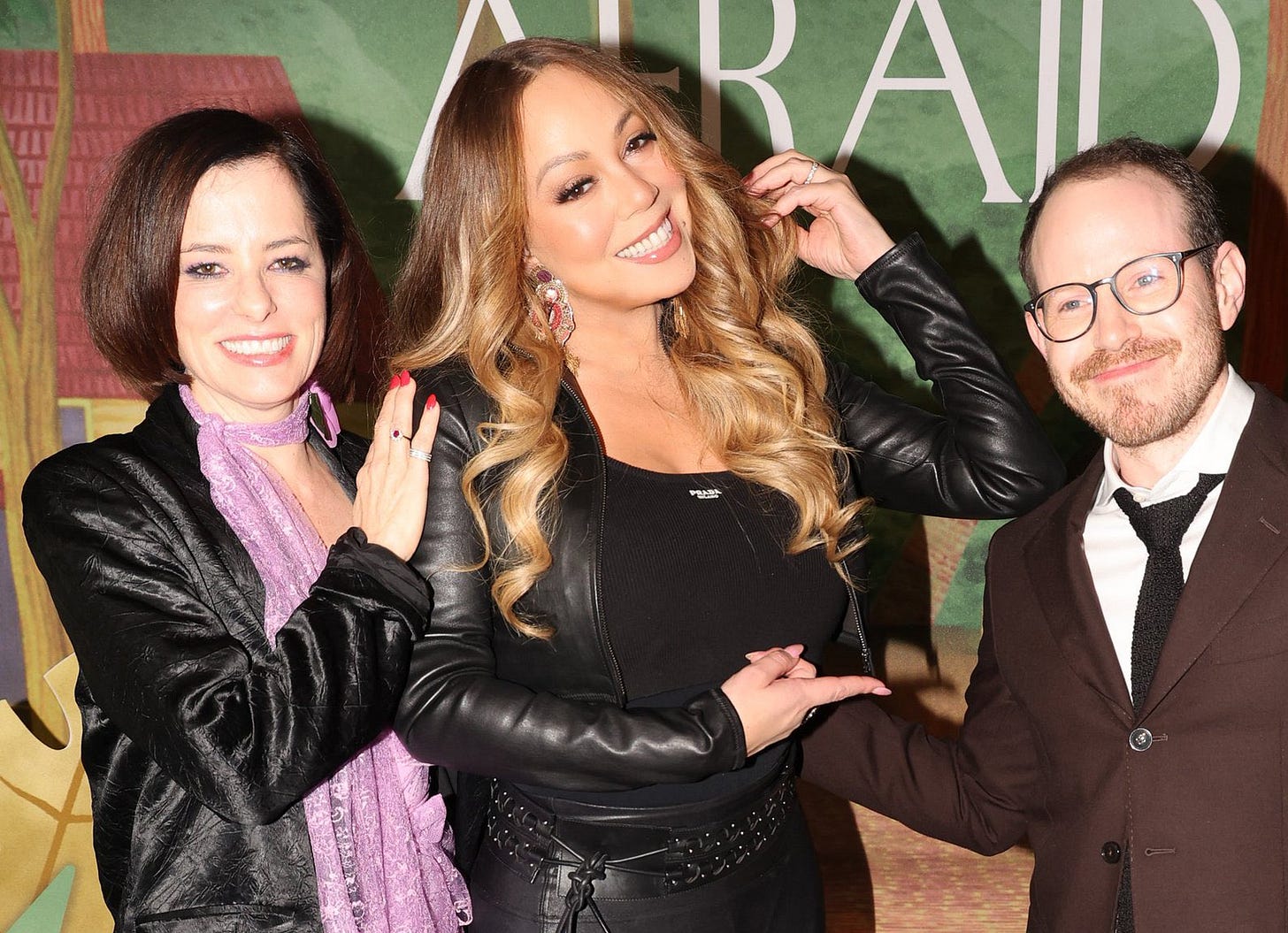
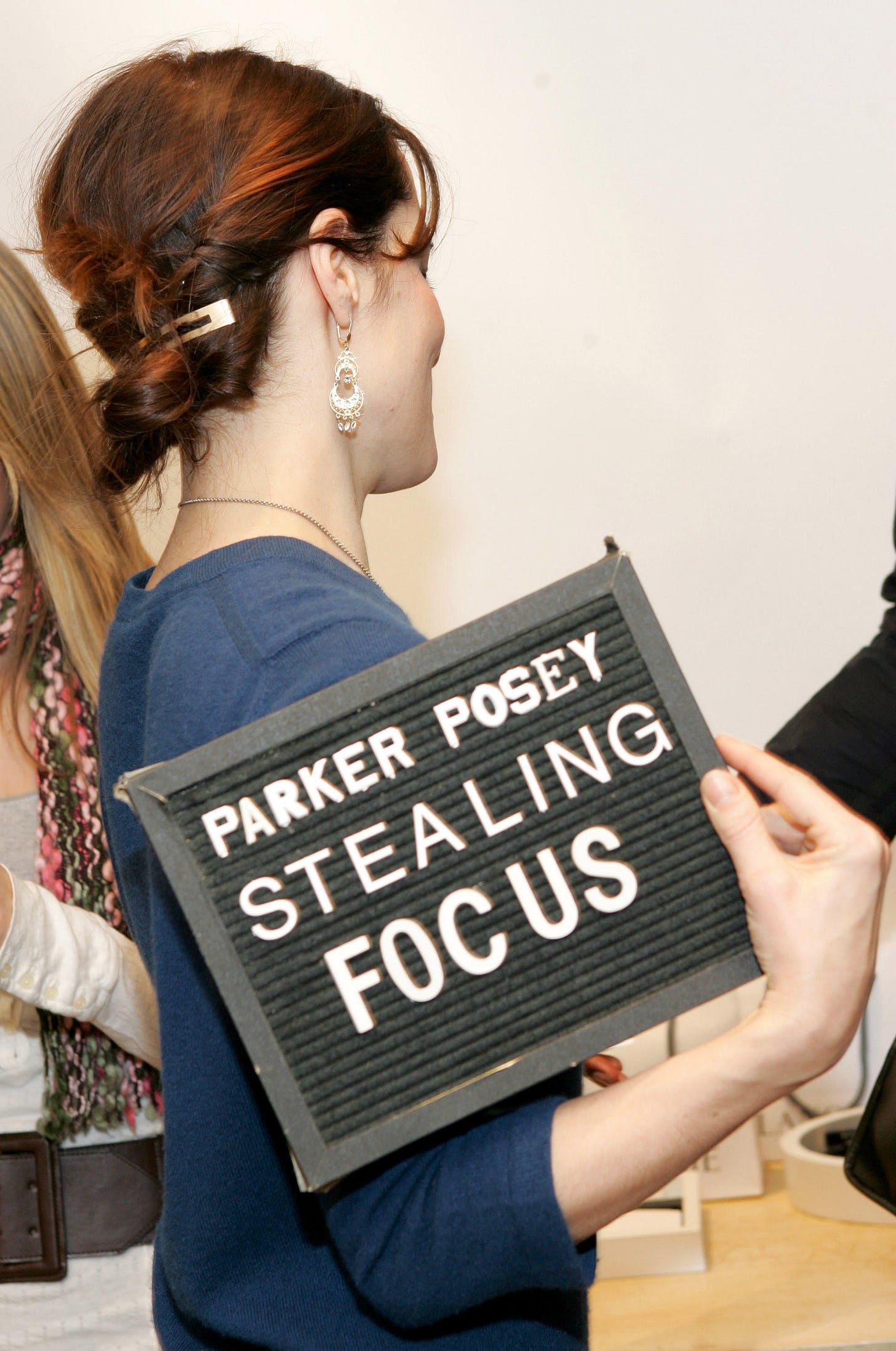
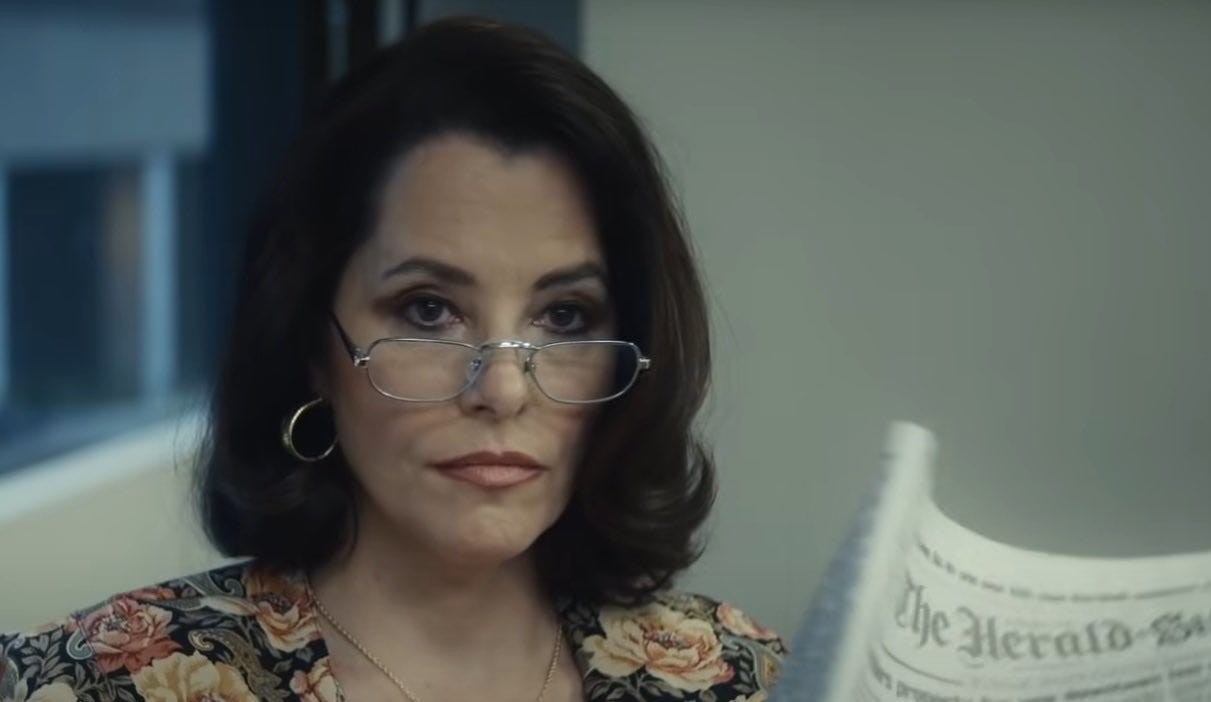
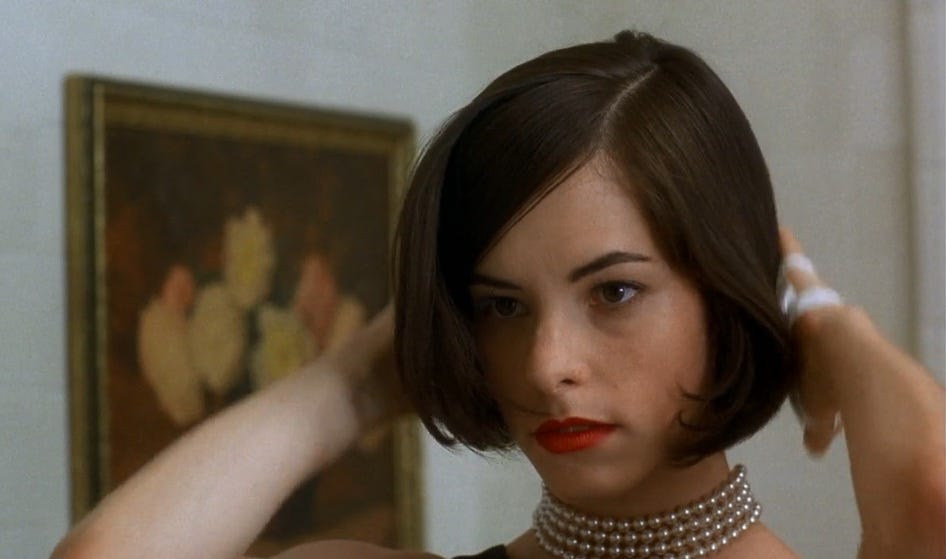
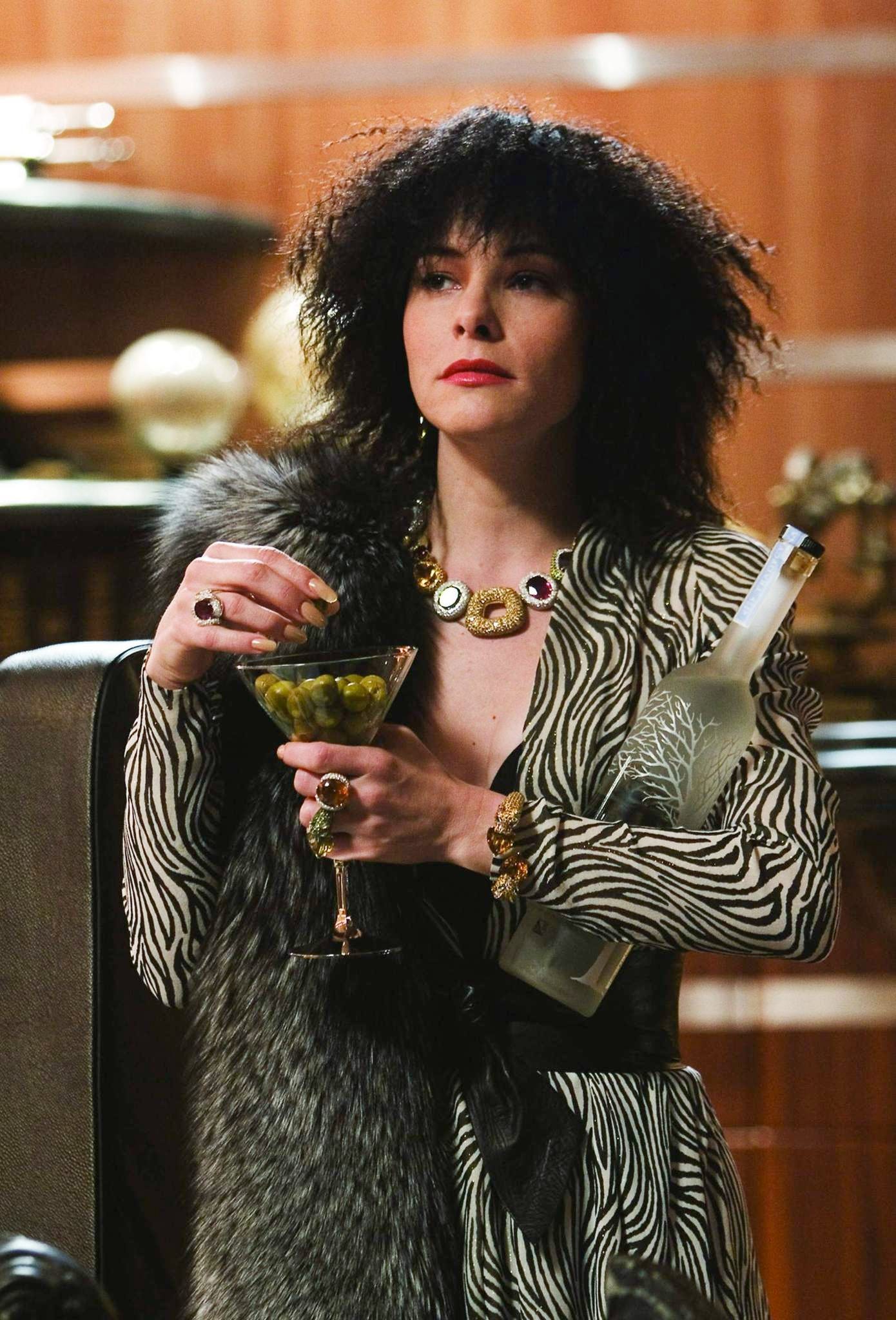
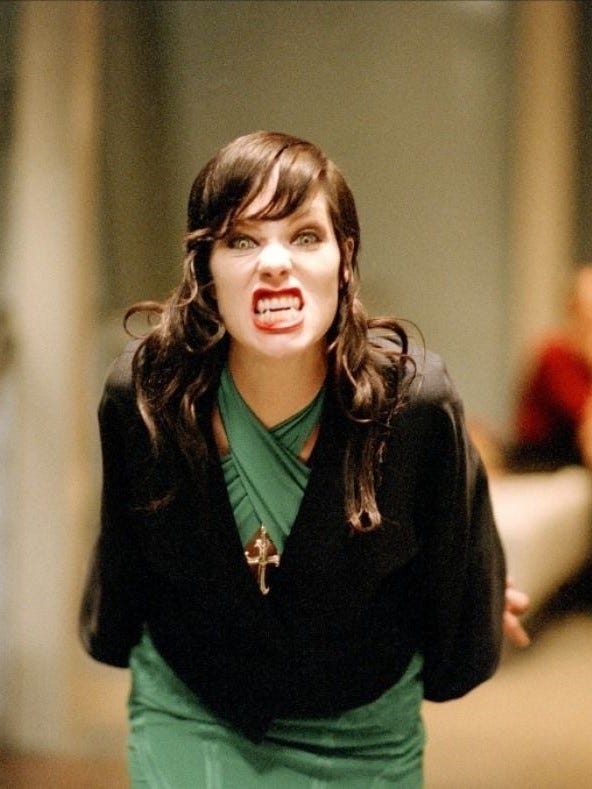


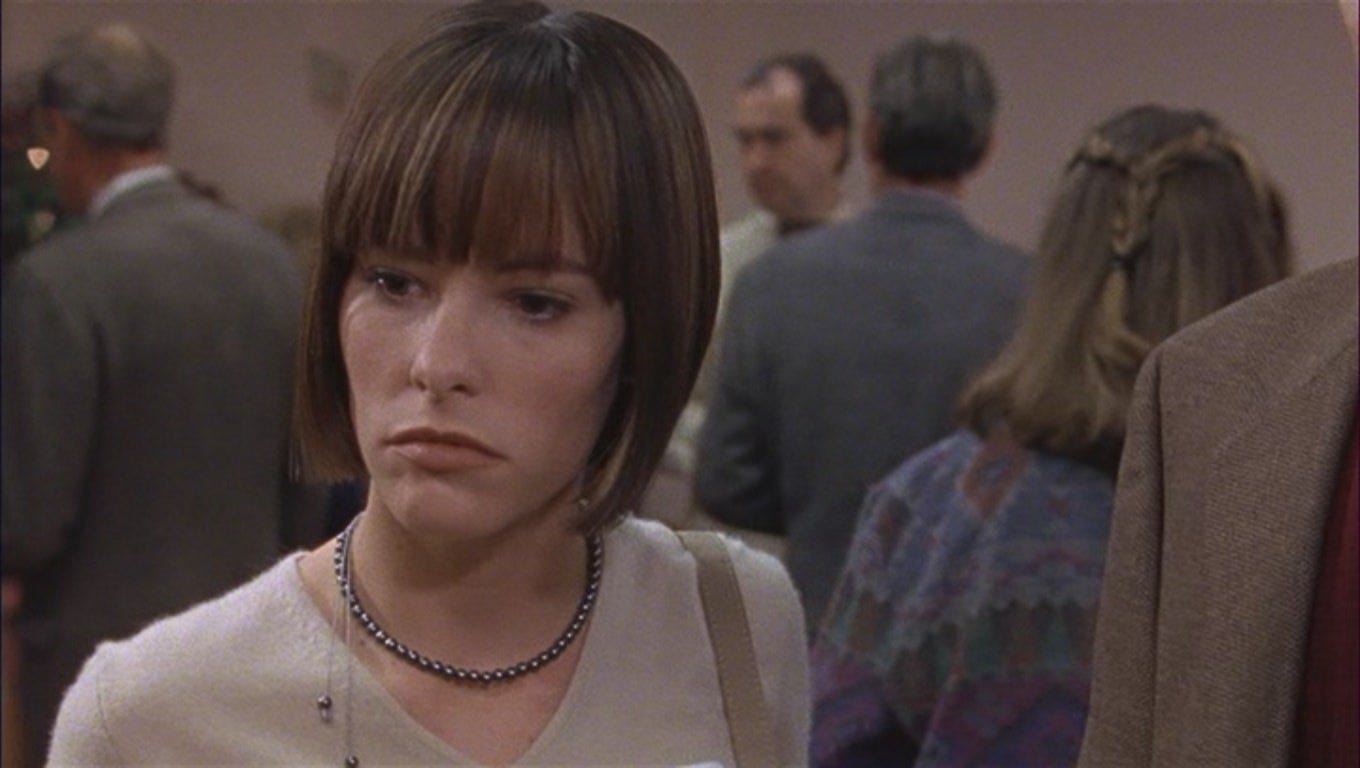

What a GREAT interview. I can't say that I know much about Parker, tbh I haven't watched many of her movies though I understand she's brilliant and this kind of cult actress. This was a really great way to learn what makes her tick. And what a generous interviewer you are, Evan.
House of Yes is one of the best movies, EVER. I adore Parker Posey and this interview is gold.